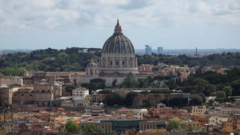The funeral of Pope Francis is expected to draw significant attention not only for its somber context but also for the potential diplomatic dialogues that may unfold among global leaders. This gathering will mark one of the largest assemblies of heads of state since the 2022 funeral of the late Queen. While formal meetings are unlikely due to the nature of the event, 'brush-by' conversations—unplanned exchanges as leaders find their seats—are anticipated.
Pope Francis's Funeral: An Unexpected Diplomatic Confluence

Pope Francis's Funeral: An Unexpected Diplomatic Confluence
World leaders might leverage the upcoming funeral of Pope Francis to engage in unscheduled diplomacy amidst a solemn occasion.
President Trump and President Zelensky, seated in close proximity at St Peter's Square, hold the spotlight with speculation surrounding a potential discussion on Ukraine's ceasefire. Both leaders have signaled their openness to meet, although the actual likelihood remains uncertain given recent developments and travel complications, especially for Zelensky following Russian strikes on Kyiv.
The backdrop of this funeral, attended by an estimated 170 delegations, presents opportunities for informal dialogue and engagement among nations. However, such events also bear the risk of unforeseen confrontations, particularly since neutral venues like the Vatican can host leaders who might otherwise face travel restrictions.
The dynamics at play extend beyond mere ceremonial observance. During the funeral Mass, the traditional sign of peace exchanged among attendees could inadvertently place leaders in uncomfortable situations. Historical instances, such as George Bush receiving boos during a funeral crowd reaction, highlight the unpredictability of such events.
While "working funerals" provide a platform for discreet yet substantive discussions, they are also tempered by respectful acknowledgment of the occasion. As highlighted by experts, these gatherings often offer a unique setting for urgent dialogue without the pressures typically associated with formal summits.
In anticipation of the funeral, the diplomatic community remains alert to possible interactions, recognizing that even amid grief, significant opportunities for dialogue may arise.
The backdrop of this funeral, attended by an estimated 170 delegations, presents opportunities for informal dialogue and engagement among nations. However, such events also bear the risk of unforeseen confrontations, particularly since neutral venues like the Vatican can host leaders who might otherwise face travel restrictions.
The dynamics at play extend beyond mere ceremonial observance. During the funeral Mass, the traditional sign of peace exchanged among attendees could inadvertently place leaders in uncomfortable situations. Historical instances, such as George Bush receiving boos during a funeral crowd reaction, highlight the unpredictability of such events.
While "working funerals" provide a platform for discreet yet substantive discussions, they are also tempered by respectful acknowledgment of the occasion. As highlighted by experts, these gatherings often offer a unique setting for urgent dialogue without the pressures typically associated with formal summits.
In anticipation of the funeral, the diplomatic community remains alert to possible interactions, recognizing that even amid grief, significant opportunities for dialogue may arise.





















